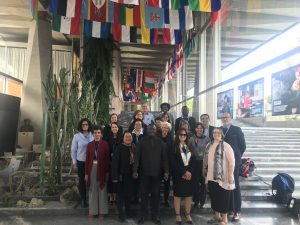Faculty On the Global Scene – Dr. Sabrina Wong and Dr. Elizabeth Saewyc Share Their Expertise
Faculty On the Global Scene – Dr. Sabrina Wong and Dr. Elizabeth Saewyc Share Their Expertise
UBC School of Nursing faculty have long been well-recognized and much sought after as national and international experts consulting on a range of topics in health. In 2019, two of our faculty in particular have contributed to the work of high-profile global organisations.
Dr Sabrina Wong is representing Canada on the OECD Patient-Reported Indicators Surveys (PaRIS) Initiative. The Organization for Economic Co-operation and Development (OECD), which includes 36 countries, has been mandated to develop comparable cross-country indicators for patient-reported outcome measures (PROMs) for different health conditions, and measures for assessing patients’ experiences of care (PREMs). This survey will be administered in primary care practices to those who have multiple chronic conditions — in Canada and the other OECD countries.

Sabrina Wong
Dr Wong co-leads the Strategy for Patient-Oriented Research’s Primary and Integrated Health Care Innovation Network (PIHCIN) whose research focuses on supporting better patient outcomes in primary and integrated care, with particular attention to people with or at risk of complex disease. PIHCIN encourages the development and broader application of evidence-informed service delivery models that are horizontally and vertically integrated into health care system practice and policy. The PIHCIN is a network of networks across Canada, consisting of 38 project grants (total >$20M).
Beyond indicators that measure what health care services are provided, patient-reported indicators capture outcomes that matter to patients and their families, including whether treatment reduced their pain, or helped them live more independently. People also report on their experiences, such as whether the treatment was well-explained, and if they felt involved in decisions about their care. The OECD PaRIS initiative is working to ensure comparable measures across OECD countries’ health systems, to provide international benchmarking. Dr Wong brings her expertise in measuring patient-oriented outcomes and experiences to this leadership role.

Elizabeth Saewyc stands among colleagues at the World Health Organization’s School Health Services Guidelines Development Group Meeting Geneva
14 May 019
Another UBC Nursing faculty member who is regularly invited to consult internationally is Dr Elizabeth Saewyc. Over the past 18 months, she has been tapped by the World Health Organization for three different expert roles. In January of this year, Dr Saewyc chaired the first day of the WHO-UNICEF Global Consultation Meeting on Redesigning Child and Adolescent Health Programming in the era of Sustainable Development Goals (SDGs). She is also chairing a WHO Guidelines Development Group on School Health Services, a 2-year project to evaluate existing evidence and provide guidance to high-, low-, and middle-income countries on establishing effective school health services as part of WHO’s Health Promoting Schools initiative. As part of this working group, WHO also involved UBC’s Stigma and Resilience Among Vulnerable Youth Centre (SARAVYC), which is led by Dr Saewyc, to help program and launch a survey in 6 languages among school health experts across the world over the summer.
Dr Saewyc’s third role is serving as one of 17 experts on the newly launched Global Action for Measurement of Adolescent health (GAMA) Advisory Group. GAMA was established to advise WHO and UN partners on harmonizing and prioritizing adolescent health indicators. These measures will help governments around the world more effectively track progress in improving adolescent health, and reduce the burden of reporting for low-income countries through coordinated efforts.
On these issues and many more, UBC nursing expertise in patient care, health services, and health measurement is providing leadership on important global initiatives in health policy and health monitoring.